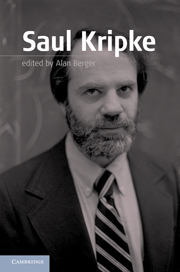Book contents
- Frontmatter
- Contents
- List of Contributors
- Introduction to Kripke
- Part I Naming, Necessity, and Apriority
- 1 Kripke on Proper and General Names
- 2 Fiction, Myth, and Reality
- 3 Kripke on Epistemic and Metaphysical Possibility
- 4 Possible Worlds Semantics
- Part II Formal Semantics, Truth, Philosophy of Mathematics, and Philosophy of Logic
- Part III Language and Mind
- Part IV Philosophy of Mind and Philosophical Psychology
- Index
- References
1 - Kripke on Proper and General Names
Published online by Cambridge University Press: 05 June 2012
- Frontmatter
- Contents
- List of Contributors
- Introduction to Kripke
- Part I Naming, Necessity, and Apriority
- 1 Kripke on Proper and General Names
- 2 Fiction, Myth, and Reality
- 3 Kripke on Epistemic and Metaphysical Possibility
- 4 Possible Worlds Semantics
- Part II Formal Semantics, Truth, Philosophy of Mathematics, and Philosophy of Logic
- Part III Language and Mind
- Part IV Philosophy of Mind and Philosophical Psychology
- Index
- References
Summary
Saul Kripke’s first contributions to philosophy were his papers on modal logic, which quickly made possible worlds semantics a working tool of philosophical logicians and then of philosophers more generally. The papers on quantified modal logic led him, he says, to think further about “rigid designation” and names. It was the resulting Naming and Necessity lectures that guaranteed wider interest in the formal logic and established Kripke as one of the leading figures in analytic philosophy of language and what came to be known as “modal” metaphysics. The lectures were presented January 20, 22, and 29, 1970, to the department of philosophy at Princeton University, where they were tape-recorded and then reworked for publication in 1972 in a volume of papers on semantics. They were then published as a separate book in 1980 with a preface that included a discussion of some replies to the original version and nine pages of “Addenda” and footnotes.
The Naming and Necessity lectures had a revolutionary effect on philosophical attitudes toward a number of topics, some of which are described in later chapters in this book. The most significant effects outside of semantic theory were a shift in attitude toward the notion of essential properties and a sudden burst of discussion of the doctrines of essentialism about origin and constitution and other topics that had been dismissed by Quine as belonging in the “jungle of Aristotelian essentialism.” The lectures introduced the novel categories of a posteriori necessary truths and even a priori contingent truths and so started a discussion of the content of assertions of knowledge and belief that is still developing. To cap the lectures, Kripke presented a new argument for mind/body dualism, which was at first viewed as a curiosity, but has since worked its way into the fields of philosophy of mind and historical work on Descartes.
- Type
- Chapter
- Information
- Saul Kripke , pp. 17 - 48Publisher: Cambridge University PressPrint publication year: 2011
References
- 1
- Cited by



